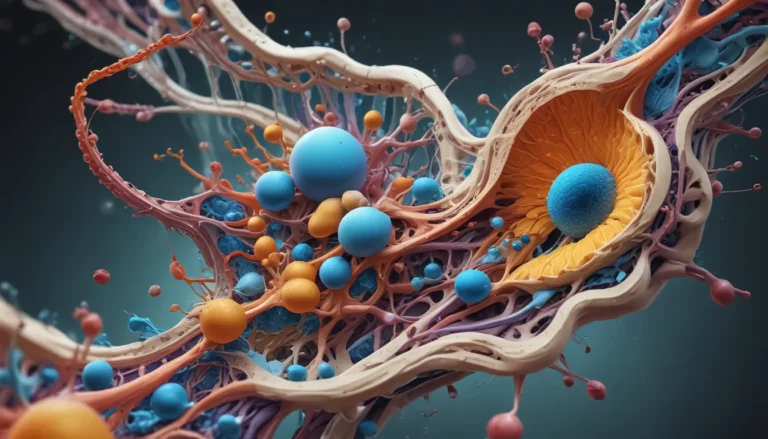A Note About Images: The images used in our articles are for illustration purposes only and may not exactly match the content. They are meant to engage readers, but the text should be relied upon for accurate information.
Autoimmunity is a captivating and intricate phenomenon that impacts millions of individuals worldwide. The immune system, designed to safeguard the body from harmful invaders, can sometimes turn on itself, leading to a wide range of debilitating conditions and diseases. In this article, we will unveil 13 astonishing facts about autoimmunity that will not only pique your curiosity but also provide valuable insights into the complexities of the human body. Let’s embark on a journey to discover the fascinating world of autoimmunity and gain a deeper understanding of how it affects our health and well-being.
Unveiling the Complexities of Autoimmunity
Autoimmune diseases collectively affect a significant portion of the global population, with over 50 million individuals estimated to suffer from these disorders. Women are more commonly affected than men, highlighting the gender disparity in autoimmune conditions. The immune system’s ability to target any organ or system in the body adds to the complexity of autoimmune diseases, leading to diverse symptoms and manifestations.
A Genetic & Environmental Interplay
Genetic factors play a crucial role in the development of autoimmunity, with certain genetic predispositions increasing an individual’s susceptibility to autoimmune diseases. Additionally, environmental factors such as infections, toxins, and medications can trigger the onset of these conditions, disrupting the delicate balance of the immune system and leading to self-attack. The interplay between genetics and the environment underscores the multifactorial nature of autoimmunity.
Malfunction in Immune Regulation
A key aspect of autoimmunity involves a malfunction in immune regulation, where the immune system fails to differentiate between self and non-self. This breakdown in immune tolerance results in an attack on the body’s own tissues, contributing to the development of autoimmune diseases. Understanding the mechanisms behind immune dysregulation is essential for unraveling the complexities of autoimmunity.
Diverse Symptoms & Diagnosis Challenges
Autoimmune diseases exhibit a wide range of symptoms, depending on the specific condition and organs/systems involved. Common symptoms include fatigue, joint pain, skin rashes, digestive issues, and neurological problems. Diagnosing autoimmune diseases can be challenging due to overlapping symptoms with other conditions, necessitating a comprehensive approach that combines medical history, physical examination, laboratory tests, and sometimes invasive procedures.
Impact on Quality of Life
Living with an autoimmune disease can be a challenging journey, characterized by chronic symptoms, frequent medical visits, and the need for lifelong management. These conditions can significantly impact various aspects of a person’s life, including physical, emotional, and social well-being. Providing support and appropriate management strategies is crucial for individuals affected by autoimmunity.
Ongoing Advances in Research
The field of autoimmunity research is rapidly advancing, with scientists and researchers making significant strides in understanding these conditions and developing new treatment options. The evolving landscape of immunology offers hope for improved therapies and potential cures in the future, enhancing the outlook for individuals living with autoimmune diseases.
Dispelling Myths & Misconceptions
Contrary to popular belief, autoimmune diseases are not contagious and cannot be transmitted from one person to another. These conditions are rooted in a complex interplay of genetic and environmental factors, rather than being infectious in nature. By debunking myths and misconceptions surrounding autoimmunity, we can foster a better understanding of these conditions and promote awareness and support for individuals affected by autoimmune diseases.
A Lifelong Journey
Most autoimmune diseases currently have no known cure, emphasizing the importance of ongoing management to control symptoms, reduce inflammation, and modulate the immune response. While living with autoimmunity may pose challenges, with appropriate care and support, individuals can lead fulfilling lives and navigate the complexities of these conditions with resilience and strength.
Conclusion: Navigating the Intricacies of Autoimmunity
In conclusion, autoimmunity remains a complex and fascinating area of study that continues to intrigue researchers and medical professionals worldwide. From unraveling the genetic and environmental factors that contribute to autoimmune diseases to exploring the diverse symptoms and impact on quality of life, delving into the world of autoimmunity offers valuable insights into the complexities of the immune system. By raising awareness, supporting further research, and fostering a collaborative approach to diagnosis and treatment, we can pave the way for improved outcomes and better quality of life for individuals living with autoimmune diseases.
FAQs: Your Autoimmunity Questions Answered
-
Q: What causes autoimmune diseases?
A: Autoimmune diseases are believed to result from a combination of genetic predisposition and environmental triggers, highlighting the multifactorial nature of these conditions. -
Q: How common are autoimmune diseases?
A: Autoimmune diseases collectively affect around 5-10% of the global population, with up to 50 million individuals estimated to have some form of autoimmune disease in the United States. -
Q: Can autoimmune diseases be cured?
A: Currently, there is no cure for autoimmune diseases, but various treatment options are available to manage symptoms and improve quality of life for individuals affected by these conditions. -
Q: Are autoimmune diseases hereditary?
A: There is often a genetic component to autoimmune diseases, with a family history of autoimmune conditions increasing the likelihood of developing these disorders. However, environmental factors also play a significant role. -
Q: Can autoimmune diseases be prevented?
A: Preventing autoimmune diseases can be challenging due to the complex nature of these conditions. Adopting a healthy lifestyle, managing stress, and avoiding known triggers can help reduce the risk of developing autoimmune diseases.
Delving into the enigmatic world of autoimmunity unveils a fascinating landscape of complexities and intricacies, offering valuable insights into the immune system’s role in health and disease. By expanding our understanding of autoimmunity and supporting ongoing research efforts, we can work towards improving outcomes and enhancing the lives of individuals living with autoimmune diseases. Embrace the journey of discovery and understanding as we unravel the mysteries of autoimmunity together.






